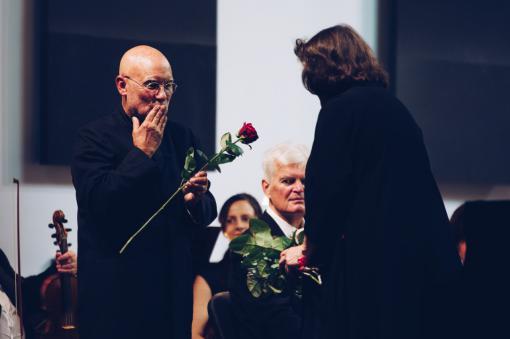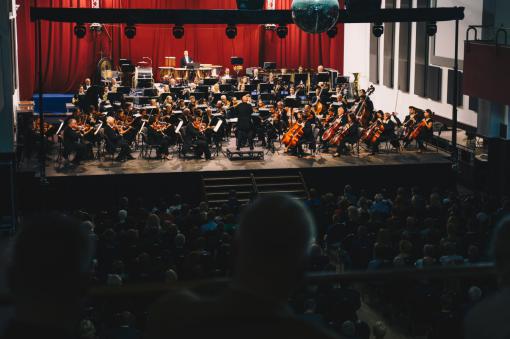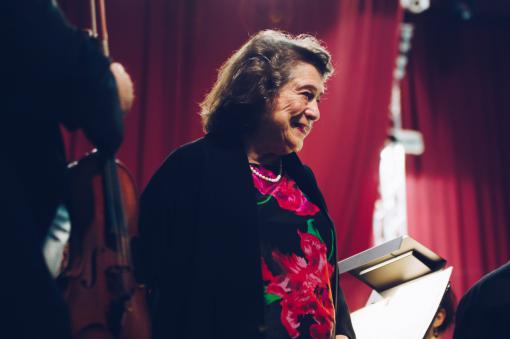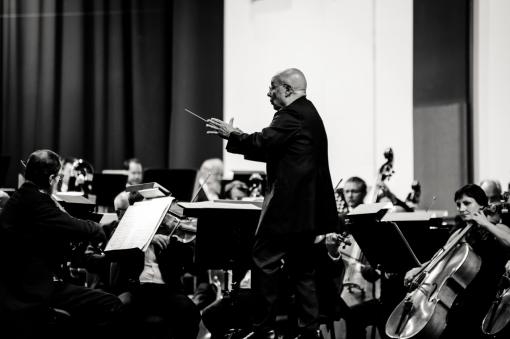The Brno Philharmonic launched its 64th season yesterday, which is also the second season of its current Chief Conductor and Artistic Director Dennis Russell Davies. Beside him, the leading Russian pianist Elisabeth Leonskaja also stood on the stage of the Brno Stadium. Brahms' Symphony No. 1 in C minor, Bartók's Piano Concerto No. 3 in E major and the Czech premiere of the composition DA.MA.SHI.E by the Japanese composer Joe Hisaishi's, connected with animated films of director Hayao Miyazaki, were chosen for the ceremonial start.
Stacks of books have been written about the impact of Beethoven's music on Johannes Brahms' work, and especially on his Symphony No. 1 in C minor is seen by many as a direct continuation of Beethoven's musical ideal. Conductor and pianist Hans von Bülow even described the first Brahms' symphony as Beethoven's Tenth. Despite many melodic, tonal or tectonic similarities, the core of Brahms' work is different. Where Beethoven gives space to ecstatic exuberance of music, Brahms prefers lyrical and intimate positions. Where Beethoven roars in a heroic fortissimo, Brahms comes up with an almost melancholic confession in mezzo piano. Where Beethoven speaks to people, Brahms sings tenderly into Clara Schumann's ear. It is the task of a conductor to discover and interpret this unusual dichotomy to musicians and listeners. And this was no doubt fully achieved by Dennis Russell Davies.

The chief conductor of the Brno Philharmonic has a feeling for lyrical spots and is able to grasp them with such candid ease to even elegantly avoid the danger of a pathetic impression. Especially the strings, which were balanced expressively and transformed the conductor's intention perfectly into gentle warm music, deserve great praise. Only the solo, rendered by the concert master Pavel Walling could be questionable. The violinist used a powerful vibrato all the time – in other cases undoubtedly impressive. Here, however, it may have been too disturbing for that unpathetic and unstylized expression of the rest of the orchestra. Minor intonation and rhythmic difficulties also affected the flute solo, which, however, soon crystallized into a clear and flawless intonation.

Bartók's piano concerto introduced Elisabeth Leonskaja, a piano interpretation legend, which shone out immediately after her entry. With a light, almost jazz stroke, she accentuated the unusual colour combination of Bartók's music. Compared to most of Bartók's works, the Piano Concerto No. 3 is much more moderate, less dissonant and significantly more lyrical, yet it retains the typical features of Bartók's compositional personality. Elisabeth Leonskaja excelled in the breadth of the expression palette, with each new part given a slightly different tone than the previous one. Some sections really resembled the avant-garde connection of jazz (in the piano) and classical music. In Bartók's unusually meek work, these elements of musical modernity appear, but rendered by the Brno Philharmonic, they remained firmly woven into the musical tissue without unduly disturbing the foreground – which is another proof of Davies' sensitive handling of modern elements in music. As an encore, Elisabeth Leonskaja chose the second movement from Mozart's Piano Sonata No. 12 in F major, which she grasped with an almost Rubinsteinian rubato. In this unusually romantic interpretation, Mozart was not far away from Chopin.

The final composition DA.MA.SHI.E by the Japanese composer Joe Hisaischi was of a completely different nature, therefore minimalist, striking, and bursting with wit, energy and joy. It was a welcome spice for the initially rather serious-toned evening. It is a pity that it was only an eight-minute piece. The resulting impression was positive, but unfortunately also dramaturgically unbalanced and did not quench the sudden thirst for modern music to which it appealed the listeners. The Brno Philharmonic boldly struggled with demanding polyrhythms, and the percussion section deserved great praise for holding up the rest of the orchestra. Music cuts between the percussion instruments and the string section at the end of the piece were particularly successful. A great end of the evening!
The Brno Philharmonic therefore started its 64th season successfully. The best is yet to come, but there is no denying that the musicians are doing greatly and that their collaboration with Chief Conductor Dennis Russell Davies is undoubtedly beneficial for them. Before the next half-jubilee season we may perhaps expect a ride full of great performances and remarkable dramaturgy.
JOHANNES BRAHMS
Symphony No. 1 in C minor Op. 68
BÉLA BARTÓK
Piano Concerto No. 3 in E major Sz. 119
JOE HISAISHI
- MA. SHI. E (Illusive Image)
Stadion (Babylon Cultural Centre)
Thursday, 19 September 2019
































No comment added yet..